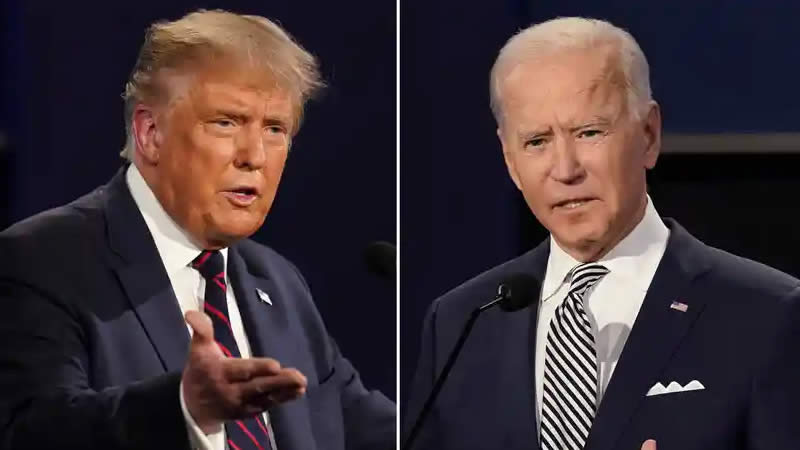In a fiery speech Tuesday in Philadelphia, President Biden took aim at former President Donald Trump and his unfounded claims that his loss in the 2020 election was due to widespread voter fraud.
“You don’t call facts ‘fake’ and then try to bring down the American experiment because you’re unhappy. That’s not statesmanship. That’s selfishness,” Biden said of Trump in remarks that promoted the passage of the For the People Act, the Democrats’ voting rights legislation, and warned of Republican efforts in several states to restrict voting.
“There’s an unfolding assault taking place in America today, an attempt to suppress and subvert the right to vote in fair and free elections. An assault on democracy, an assault on liberty, an assault on who we are as Americans,” Biden said, referring not only to the proliferation of new laws being proposed and passed in states where the Republican Party controls legislatures but also to the unsubstantiated claims fueling them.
Calling the 2020 election “the most scrutinized election ever in American history,” Biden referred to the claims routinely put forth by Trump as devoid of truth.
“The ‘big lie’ is just that, a big lie,” the president said.
With a House select committee established to investigate the Jan. 6 riot at the U.S. Capitol by Trump’s supporters to protest the certification of the Electoral College results, Biden highlighted what he has often referred to as a “dark day” in U.S. history.
“We’re facing the most significant test to our democracy since the Civil War — that’s not hyperbole — since the Civil War. Confederates back then never breached the Capitol as insurrectionists did on January the 6th,” he said.
Biden’s speech came days after he met with leaders of national civil rights organizations at the White House, who called on him to use his power and influence in a more aggressive push to pass the act. The Rev. Al Sharpton, who attended that meeting, was in the audience Tuesday as Biden spoke.
“Last Thursday when we met with him, we said we wanted him to use his bully pulpit,” Sharpton told reporters after watching the president deliver his remarks. “He used it today.”
The sense of urgency among Democrats to pass the For the People Act is a direct reaction to the moves by Republicans to enact new rules on how elections are carried out and overseen.
As of June 21, 17 states had enacted 28 new laws this year that restrict access to the vote, according to the Brennan Center for Justice. At least 61 bills with restrictive provisions are moving through 18 state legislatures, while 31 have passed at least one chamber.
A Supreme Court decision this month upheld Arizona’s voting laws, making it clear that it would be hard to fight against the restrictive legislation. That 6-3 decision further gutted the Voting Rights Act, the 1965 federal law that prohibits racial discrimination in voting, by weakening the single remaining enforcement clause after the Supreme Court invalidated a core portion of the law in 2013.
Still, Biden ended his speech on an optimistic note.
“Good news: It doesn’t have to be this way. It doesn’t have to be for real. We have the means. We just need the will. The will to save and strengthen our democracy,” he said. “Guaranteeing the right to vote, ensuring every vote is counted has always been the most patriotic thing we can do.”
Biden made no mention, however, of the Senate’s legislative filibuster, which is effectively blocking Democrats from passing legislation like the For the People Act in the absence of 60 votes. H.R. 1, which passed in the House in March, has since met a Republican-led filibuster in the Senate. In order to break the filibuster, the Senate would need a supermajority of 60 votes — including at least 10 from the GOP. But there has yet to be a consensus, even among Democrats, on how to move forward.
Moderate Democrats such as Sen. Joe Manchin, D-W.Va., have defended the filibuster and pushed for bipartisan compromise. In June, Manchin proposed a voting rights bill compromise he hoped would garner bipartisan support. The legislation would have eliminated partisan gerrymandering and increased early voting, but would have also required voter ID and allowed local election officials to purge voting rolls, provisions favored by the GOP. Republicans almost immediately rejected Manchin’s plan.



